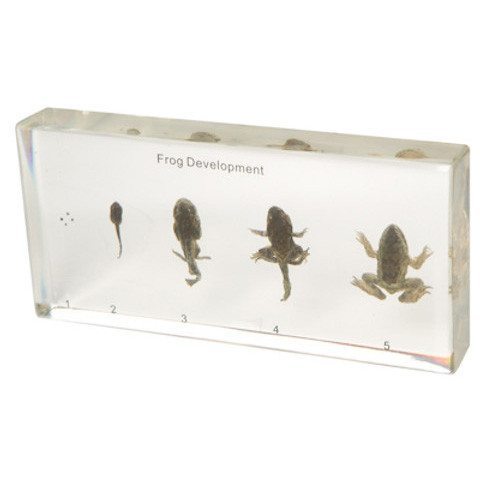Lifecycle of Frog - Fejervarya limnocharis
The Science:
The earliest fossils of True Frogs are known from the Jurassic Period. Like other Amphibians, they are able to absorb oxygen and “breathe” through their skin, and since they have no diaphragm and hardly have ribs, they cannot breathe using their chests in the way that we do. Instead they use “buccal pumping,” pumping air in and out of their lungs using their jaws. Frogs lay their eggs in large clumps in water or on wet land and when the eggs hatch the tiny tadpoles set out into open water. Predatory animals as adults, many start life eating algae and diatoms. Throughout their development the eggs and young are very vulnerable to predators, and only a small percentage make it to adulthood.
The Story:
This series of specimens mounted in a crystal-clear block of Lucite resin shows the life cycle of the Asian Grass Frog (Fejervarya limnocharis), a common frog widespread from India to Japan, in five stages from egg to adult. Captured in stunning detail, this is a superb educational display or an unusual piece of science decor for a desk or shelf!
DETAILS
SKU: AP-RE0017Dimensions: 5.5"W x 2.5"H x 1"D
Scientific Name: Fejervarya limnocharis
Origin: China
Shipping Restrictions: International wildlife export fees apply
Customers with shipping addresses outside of the US will be charged an additional fee. Read our full international wildlife shipping policy here.
- Color:
- Green
- Color:
- Brown
- Origin:
- Asia
- Impact:
- Shop Small
- Shipping Restrictions:
- IF&W







